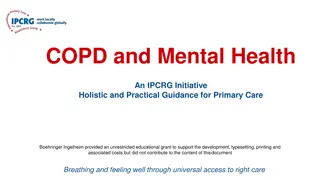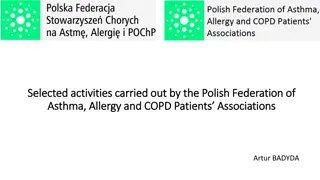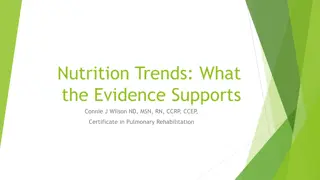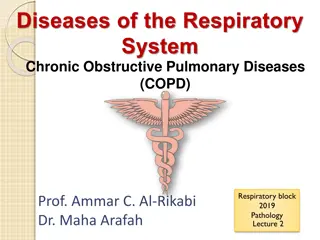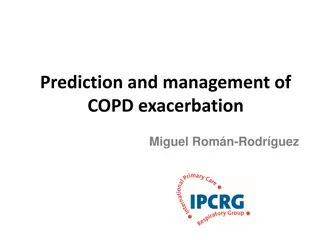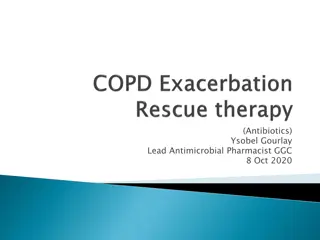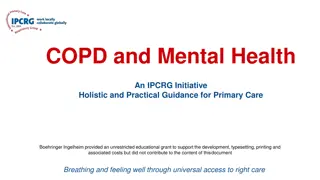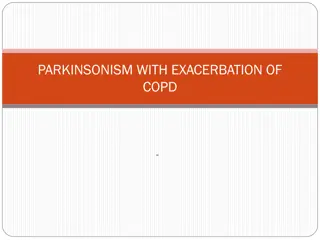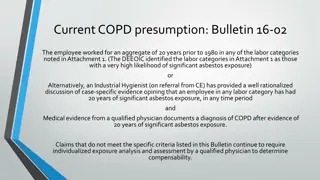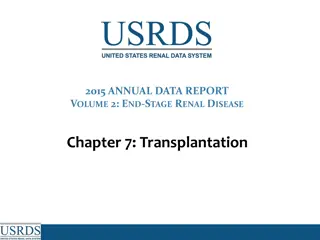Managing Mental Health in COPD Patients: Practical Insights and Interventions
Mental health issues are prevalent among COPD patients, affecting about 30% to 80% with comorbid depression and anxiety. This article aims to raise awareness among primary care professionals about identifying and managing mental health problems in COPD patients. Strategies include non-pharmacological and pharmacological interventions to enhance quality of life, address breathlessness-related psychological distress, and support tobacco cessation for improved mental well-being.
Download Presentation

Please find below an Image/Link to download the presentation.
The content on the website is provided AS IS for your information and personal use only. It may not be sold, licensed, or shared on other websites without obtaining consent from the author. Download presentation by click this link. If you encounter any issues during the download, it is possible that the publisher has removed the file from their server.
E N D
Presentation Transcript
Desktop Helper No. 12 COPD and Mental Health Ioanna Tsiligianni, Si n Williams With special thanks to Anna Spathis (contributor) and Steve Holmes, Nazim Uzzaman and Oscar Flores-Flores (reviewers) Breathing and feeling well through universal access to right care
DESKTOP Helper No. 12. https://www.ipcrg.org/dth12 Aims We aim to Raise awareness of the challenge of identifying and managing mental health problems in people with COPD Direct primary care professionals (PCPs) to assessment tools Summarise non-pharmacological and pharmacological interventions COPD, chronic obstructive pulmonary disease;
DESKTOP Helper No. 12. https://www.ipcrg.org/dth12 COPD and mental health Mental health problems are common among people with COPD1-3 o ~30% have comorbid depression (increasing to ~80% with increasing severity) 10 30% have comorbid anxiety Prevalence increases with age and as symptoms worsen and is associated with poorer QoL PCPs often have low confidence to treat mental health problems in the context of COPD and guidelines are lacking o QoL, quality of life. 1. Pollok J, et al. Cochrane Database Syst Rev 2019;3:CD012347; 2. Sohanapal R, et al. Trials 2020;21:18(2020); 3. Yohannes AM, Alexopoulos GS. Eur Respir Rev 2014;23:345-9.
DESKTOP Helper No. 12. https://www.ipcrg.org/dth12 Breathlessness and psychological distress Breathlessness can contribute to anxiety, feelings of panic, frustration, anger and low mood Interventions should seek to: o Address negative thoughts o Manage COPD symptoms o Manage anxiety and low mood Reproduced with permission of the Cambridge Breathlessness Intervention Service (https://www.btf.phpc.cam.ac.uk/) . Spathis A, et al. npj Prim Care Respir Med 2017;27:27.
DESKTOP Helper No. 12. https://www.ipcrg.org/dth12 Tobacco use and poor mental health Smoking, depression and anxiety are all associated with a higher risk of death among people with COPD Support people with COPD to quit tobacco use and reassure them that: o Quitting reduces anxiety and depression o Quitting is the single most important intervention to slow progression, increase survival and reduce morbidity1-3 See our Desktop Helper No. 4. Helping patients quit smoking4 1. GOLD 2022 Report. Available at https://goldcopd.org/2022-gold-reports-2/; 2. Williams S, et al. IPCRG Position paper No. 1. Available at: https://www.ipcrg.org/primaryrespiratorycare; 3. Tonnesen P. Eur Respir Rev 2013;1:241-50; 4. Desktop Helper No. 4 - Helping patients quit tobacco - 3rd edition. https://www.ipcrg.org/desktophelpers/desktop-helper-no-4-helping-patients-quit-tobacco-3rd-edition.
DESKTOP Helper No. 12. https://www.ipcrg.org/dth12 Assessment of mental health problems Patient Health Questionnaire 4 (PHQ-4)1 Anticipate presence of comorbid depression and anxiety Employ active listening, show empathy, observe carefully Be alert for physical symptoms Additional tools if score is high: PHQ-9 (depression), GAD7 (anxiety) Available in multiple languages 1. Available at: https://qxmd.com/calculate/calculator_476/patient-health-questionnaire-4-phq-4.
DESKTOP Helper No. 12. https://www.ipcrg.org/dth12 Use OARS skills in assessment Available at: https://www.euro.who.int/__data/assets/pdf_file/0008/394208/Session-5.pdf
DESKTOP Helper No. 12. https://www.ipcrg.org/dth12 Non-pharmacological interventions to address mental health problems in COPD Intervention Benefits Cognitive behavioural therapy Challenges unhelpful thoughts/behaviours and reduces anxiety Mindfulness/meditation Reduces breathlessness as well as anxiety/depression in advanced disease Relaxation techniques Can help breathlessness as well as anxiety and fatigue Acupuncture/pressure Helpful in advanced disease and may reduce anxiety Singing therapy Can improve lung function and may improve anxiety and QoL Positive psychology giving sense of control/confidence Improved self-efficacy Social presence May reduce breathlessness perception; patients describe reassurance from the presence of others See our online version for full details of supporting evidence.
DESKTOP Helper No. 12. https://www.ipcrg.org/dth12 Pharmacological interventions to address mental health problems in COPD Manage breathlessness using bronchodilator therapy1 Treat tobacco dependence2 Consider antidepressant medication for low mood:2 o SSRIs (preferred) o TCAs (not for those with severe COPD) Consider benzodiazepines for management of acute, distressing anxiety3 but not for breathlessness4 SSRI, selective serotonin reuptake inhibitor; TCA, tricyclic antidepressant. 1. GOLD 2022 Report. Available at https://goldcopd.org/2022-gold-reports-2/; 2. Pollok J, et al. Cochrane Database Syst Rev 2019;3:CD012347; 3. NICE. BNF. Hypnotics and anxiolytics. Available at: https://bnf.nice.org.uk/treatment-summary/hypnotics-and-anxiolytics.html; 4. Simon S, et al. Cochrane Database Syst Rev 2010;1: CD007354.
DESKTOP Helper No. 12. https://www.ipcrg.org/dth12 Acknowledgements Funded from an education grant provided by Boehringer Ingelheim to support the development, typesetting, printing and associated costs; did not contribute to the content
Questions? Breathing and feeling well through universal access to right care


